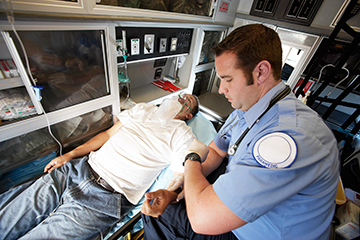Alerting people to your special medical needs in an emergency
 When you’re in a medical emergency and can’t speak for yourself it is important that you have a way of informing the persons assisting you of your special medical needs. You could be in a car accident, unconscious, suffering from shock or suffer from dementia. When you have special medical needs it’s very important that the person rescuing you or assisting you’re aware of those needs.
When you’re in a medical emergency and can’t speak for yourself it is important that you have a way of informing the persons assisting you of your special medical needs. You could be in a car accident, unconscious, suffering from shock or suffer from dementia. When you have special medical needs it’s very important that the person rescuing you or assisting you’re aware of those needs.
Medic Alert Foundation of South Africa is a non-profit, section 21 Company that provides medical and rescue teams with your medical information when needed. When you have special medical needs you can join MedicAlert Foundation South Africa. After you join the foundation they will maintain a database of your medical information that’ll be made available to medical authorities in the event of an emergency.
As a member you can supply critical medical data to the organisation and will receive a distinctive metal bracelet or necklace tag which is worn at all times. The information on the bracelet will allow emergency medical personnel or law-enforcement officers to access your medical history and special medical needs.
This information will guide medical personnel in your treatment when you aren’t able to speak for yourself. You’ll receive the appropriate medical care and will save your life in an emergency.
The following information will be engraved on your MedicAlert Foundation ID:
- Your membership identification number.
- The telephone number of MedicAlert's 24-hour Emergency Hotline.
- Information specific to your needs. This information can indicate if you have -
- a mental illness/disability,
- a heart or respiratory condition,
- dementia or Alzheimer's, or
- an allergy.
 The information you supply will be considered when MedicAlert sets up our custom engraving profile. MedicAlert will also follow the instructions of your doctor, if necessary.
The information you supply will be considered when MedicAlert sets up our custom engraving profile. MedicAlert will also follow the instructions of your doctor, if necessary.
How does it work?
As a member of MedicAlert you’ll wear a custom-made bracelet or necklace (known as an Emblem) engraved with your personal identification number, main medical condition(s) and the 24-hour emergency telephone number. Each tailor-made emblem bears the internationally recognised symbol for medicine.
In an emergency this number can be contacted to give medical personnel access to your information. This will enable them to give you the appropriate care.
For more information please contact the MedicAlert Foundation of South Africa.
Medical information in an emergency
It’s very important that you keep medical information that explains your medical needs on you in case of an emergency to help first responders attending to you. Make sure that the information is clearly labelled so that a first respondent can find it quickly in a medical emergency.
If you have the following medical conditions it’s very important that it’s readily available.
If you have:
- been diagnosed with a chronic medical condition, (diabetes, asthma, etc.).
- a terminal illness, (cancer, heart failure, etc.).
- a severe allergy to food, medication or latex.
- a pacemaker or other metal implants.
Alzheimer's patients should also have an ID that includes the contact number of a caregiver.
If you don’t have a Medic Alert bracelet there are other ways to make sure that your medical information is easily accessible.
- You can keep a credit card size piece of paper in your wallet or purse with your medical information on it.
- If you have an extensive medical history it might be best to keep the information on a small flash drive in your purse/wallet.
- Add your emergency contact information to your cell phone by making a contact named "ICE" (In Case of Emergency) with the phone number of your contact.
- Keep a print out of your special medical needs on your fridge where it will be visible to emergency people responding to a call at home.
Information that should be included:
- All medication, include names and dosages.
- Medical conditions, such as diabetes, heart conditions, etc.
- Doctor's information and emergency contacts. .
- Prior health history.
- Medication allergies. If you're allergic to penicillin, etc.
- Past surgical history.
- Your immunisation history.
- Allergies, sensitivities and dietary restrictions.
Make sure that all the information is complete and accurate.


